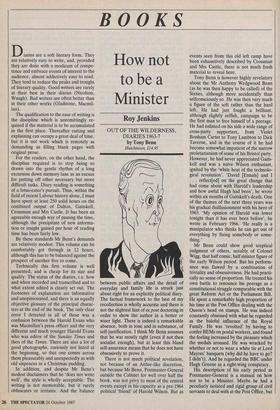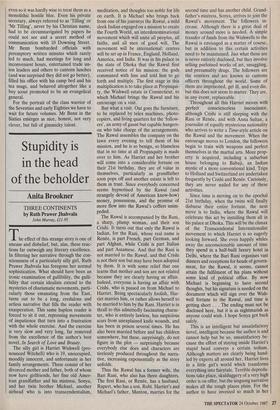BOOKS
How not to be a Minister
Roy Jenkins
OUT OF THE WILDERNESS, DIARIES 1963-7 by Tony Benn
Hutchinson, £14.95
Diaries are a soft literary form. They are relatively easy to write, and, provided they are done with a modicum of compe- tence and embrace events of interest to the audience, almost addictively easy to read. They tend to reduce the peaks and troughs of literary quality. Good writers are rarely at their best in their diaries (Nicolson, Waugh). Bad writers are often better than in their other works (Gladstone, Macmil- lan).
The qualification to the ease of writing is the discipline which is unremittingly re- quired if the material is to be accumulated in the first place. Thereafter cutting and explaining can occupy a great deal of time, but it is not work which is remotely as demanding as filling blank pages with original prose.
For the readers, on the other hand, the discipline required is to stop being so drawn into the gentle rhythm of a long excursion down memory lane as an excuse for putting off other necessary but more difficult tasks. Diary reading is something of a lotus-eater's pursuit. Thus, within the field of recent Labour history alone, I must have spent at least 250 solid hours on the combined output of Dalton, Gaitskell, Crossman and Mrs Castle. It has been an agreeable enough way of passing the time, although the precipitate of new informa- tion or insight gained per hour of reading time has been fairly low.
By these standards Mr Benn's demands are relatively modest. This volume can be comfortably got through in 12 hours, although this has to be balanced against the prospect of another five to come.
Technically this first volume is well presented, and is cheap for its size and quality. The status of the diaries, i.e. how and when recorded and transcribed and to what extent edited is clearly set out. The footnotes of explanation are informative and unopinionated, and there is an equally objective glossary of the principal charac- ters at the end of the book. The only clear error I detected in all of these was a confusion between the Harold Evans who was Macmillan's press officer and the very different and much younger Harold Evans who was editor of the Sunday Times and then of the Times. There are also a lot of good photographs, curiously not listed at the beginning, so that one comes across them pleasurably and unexpectedly as with old sixpences in a Christmas pudding.
In addition, and despite Mr Benn's modest disclaimers that he 'does not write well', the style is wholly acceptable. The writing is not memorable, but it rarely obfuscates or irritates. And the balance between public affairs and the detail of everyday and family life is struck just about right for an explicitly political diary. The factual framework to the best of my recollection is wholly accurate and there is not the slightest hint of ex post doctoring in order to show the author in a better or wiser light. There is indeed a remarkable absence, both in tone and in substance, of self-justification. I think Mr Benn assumes that he was mostly right (even if not then socialist enough), but at least this bland self-assurance means that he does not have obsessively to prove it.
There is not much political revelation, not because of an Attlee-like discretion, but because Mr Benn, Postmaster-General outside the Cabinet for well over half the book, was not privy to most of the central events except in his capacity as a pre-1964 political 'friend' of Harold Wilson. But as events seen from this old left camp have been exhaustively described by Crossman and Mrs Castle, there is not much fresh material to reveal here.
Tony Berm is however highly revelatory about the Mr Anthony Wedgwood Benn (as he was then happy to be called) of the Sixties, although more accidentally than selfconsciously so. He was then very much a figure of the soft rather than the hard left. He had just fought a brilliant, although slightly selfish, campaign to be the first man to free himself of a peerage. He had enlisted on his side a wide range of cross-party supporters, from Violet Bonham Carter to Tony Lambton to Dick Taverne, and in the course of it he had become somewhat impatient of the narrow proletarianism of some of his Bristol party. However, he had never appreciated Gaits- kell and was a naïve Wilson enthusiast, ignited by the 'white heat of the technolo- gical revolution'. 'David [Ennals] and I . . . reflect[ed] on the great change that had come about with Harold's leadership and how awful Hugh had been', he wrote within six months of Gaitskell's death. One of the themes of the next three years was his gradual disillusionment with his hero of 1963. 'My opinion of Harold was lower tonight than it has ever been before', he wrote in February 1966. 'He really is a manipulator who thinks he can get out of everything by fixing somebody or some- thing.'
Mr Benn could show good sceptical judgment of others, notably of Colonel Wigg, that half comic, half sinister figure of the early Wilson period. But his perform- ance was flawed by a combination of triviality and obsessiveness. He had practi- cally no sense of proportion. He treated his own battle to renounce his peerage as a constitutional struggle comparable with the great Reform Act or the Parliament Bill. He spent a remarkably high proportion of his time at the Post Office dealing with the Queen's head on stamps. He was indeed constantly obsessed with what he regarded as the baleful influence of the Royal Family. He was 'revolted' by having to confer BEMs on postal workers, and found the feeling increased by the pleasure which the medals aroused. He was wracked by whether or not to wear a white tie at Lord Mayors' banquets (why did he have to go? I didn't). And he regarded the BBC under Hugh Greene as a right-wing conspiracy.
His description' of his early period as Postmaster-General is a manual on how not to be a Minister. Maybe he had a peculiarly isolated and rigid group of civil servants to deal with at the Post Office, but even so it was hardly wise to treat them as a monolithic hostile bloc. Even his private secretary, always referred to as 'Tilling' or `Mr Tilling', never by his Christian name, had to be circumnavigated by papers he could not see and a secret method of communication with 10 Downing Street. Mr Benn bombarded officials with peremptory written minutes which rarely led to much, had meetings for long and inconvenient hours, entertained trade un- ion leaders and others to canteen lunches (and was surprised they did not go better), filled his office with his camp bed and his tea mugs, and behaved altogether like a boy scout promoted to be an evangelical general.
For the portrait of the class warrior of the Seventies and early Eighties we have to wait for future volumes. Mr Benn in the Sixties emerges as nice, honest, not very clever, but full of gimmicky talent.



















































 Previous page
Previous page